Annual housing complaints report 2023 to 2024
Annual housing complaints performance and service improvement report - 2023 to 2024
This report sets out a summary of the complaints received by Ashfield District Council in relation to the delivery of its housing services that fall within the jurisdiction of the Housing Ombudsman Service during 2023 to 2024. These are broken down and analysed by stage, service, complainant’s ethnicity, compensation award and type. Customer feedback is also set out alongside the learning from complaints, along with any changes we have made to services following complaints received during 2023 to 2024.
2.1 Number of complaints
During 2023-2024, 54 Stage One housing complaints were received, broken down as follows:
- Q1 - 15
- Q2 - 14
- Q3 - 12
- Q4 - 13
We also received 10 Stage Two formal complaint escalations.
This graph shows a breakdown of the stage one complaints received during 2023 to 2024 and the average time taken (working days) to respond on the right axis.
2.1 Stage one complaints
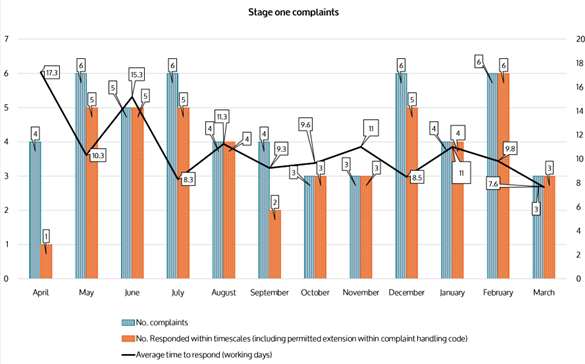
Chart information
A bar chart with columns for the stage one complaint volumes and the numbers responded to within complaint handling timescales for 2023 to 2024, by month.
Overlaid is a line graph with the average time to respond to stage one complaints throughout 2023 to 2024. Complaints were responded outside of timescales in April (3), May (1), July (1), September (2), December (1).
The average time to respond line has peaks and troughs throughout the year, with the overall general trend being the average time reducing as the year progresses.
2.2 Performance
There has been a 29.9 percent reduction in the number of stage one complaints received in 2023 to 2024, compared to the previous year. However, stage one complaint volumes remain higher than 2021 to 2022. Stage two complaints have increased by 25percent, compared to the same period last financial year. However, the proportion of complaints escalating to stage two remains relatively low at 18.5 percent.
2.2 Stage one complaint comparison
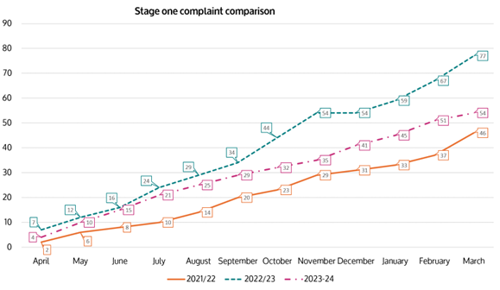
Chart information
A line graph with stage one complaint volumes of the previous 3 financial years. All 3 lines have a similar upward trend, with complaint volumes being highest in 2022 to 2023 and lowest in 2021 to 2022.
2.2 Stage two complaint comparison
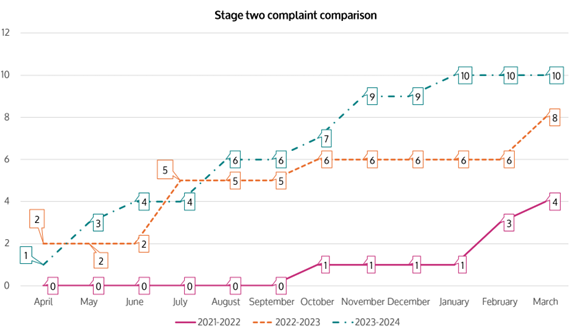
Chart information
A line graph with stage two complaint volumes of the previous 3 financial years. All 3 lines have a similar upward trend, with 2023 to 2024 being steeper than the other 2 years. Complaint volumes are highest in 2023 to 2024 and lowest in 2021 to 2022.
In 2023 to 2024, stage one complaints took an average of 10.7 days to respond to, which is 14.8 percent higher than the previous years performance and slightly over the target. Extensions to response times above the target response time are permitted under the Housing Ombudsman Services’ Complaint Handling Code and have been utilised in all but one case where the response time exceeded target. In this case failure to implement a permitted extension was the result of confusion regarding the definition of ‘working days’ over the period of enforced office closure period during the Christmas period in December.
85 percent of stage one complaints were responded to within complaint handling timescales, as defined by the Regulator of Social Housing’s Tenant Satisfaction Measures guidance, which was predominantly due to delays in acknowledging the complaint.
51.9 percent of the stage one complaints received in 2023 to 2024 were found to be upheld or partially upheld, which is consistent with the previous year’s decision rate.
2.3 Breakdown of stage one complaints/service requests by service area YTD
| Service area | Number received |
Working days taken |
Average time to respond (working days) |
Percentage responded to within target |
Justified/part justified complaints |
Number of service requests (Not complaints) |
|---|---|---|---|---|---|---|
| Assets | 6 | 54 | 9 | 66.67 | 6 | 1 |
| Support services | 1 | 9 | 9 | 100 | 1 | 11 |
| Lettings | 2 | 14 | 7 | 50 | 0 | 1 |
| Planned and cyclical | 2 | 16 | 8 | 100 | 2 | 2 |
| Tenancy services (ASB – CST) | 10 | 130 | 13 | 70 | 3 | 29 |
| Responsive repairs | 22 | 208 | 9.5 | 95.5 | 9 | 1 |
| Housing management | 11 | 147 | 13.4 | 90.9 | 7 | 0 |
| Total | 54 | 578 | 10.7 | 85.2 | 28 | 46 |
2.4 Breakdown by stage of complaint
Stage one - target (5 working days for acknowledgement; 10 working days for response)
| Month | Number of complaints | Number responded within timescales (including permitted extension within complaint handling code) |
Number of service requests (not complaints) |
Number of working days | Average time to respond (working days) |
|---|---|---|---|---|---|
| April 2023 |
4 | 1 | 3 | 69 | 17.25 |
| May 2023 |
6 | 5 | 3 | 62 | 10.33 |
| June 2023 |
5 | 5 | 7 | 76 | 15.2 |
| July 2023 |
6 | 5 | 1 | 50 | 8.33 |
| August 2023 |
4 | 4 | 1 | 45 | 11.25 |
| September 2023 |
4 | 2 | 4 | 37 | 9.25 |
| October 2023 |
3 | 3 | 4 | 29 | 9.67 |
| November 2023 |
3 | 3 | 3 | 33 | 11 |
| December 2023 |
6 | 5 | 2 | 51 | 8.5 |
| January 2024 |
4 | 4 | 8 | 44 | 11 |
| February 2024 |
6 | 6 | 5 | 59 | 9.83 |
| March 2024 |
3 | 3 | 5 | 23 | 7.67 |
| Total | 54 | 85.20% | 46 | 578 | 10.7 |
Non-compliant stage one responses (Complaint Handling Code timescales)
This is a list of complaints that were not responded to within complaint handling timescales, along with the reason why and the relevant department.
- Tenant – Kirkby – took 11 working days to acknowledge (Community Safety)
- Tenant – Sutton - took 11 working days to acknowledge (Community Safety)
- Tenant - Hucknall – took 7 working days to acknowledge (Community Safety)
- Tenant – Sutton - took 6 working days to acknowledge (Assets)
- Tenant – Sutton – took 8 working days to acknowledge (Assets)
- Tenant – Sutton – took 10 working days to acknowledge (Housing Management)
- Former Tenant – Sutton – took 9 working days to acknowledge, as former tenant failed to engage with a request for additional information to facilitate acknowledgement (Lettings)
- Tenant - Kirkby – took 6 working days to acknowledge and responded outside of deadlines without an extension (Responsive Repairs)
As non-compliance with the requirements of the Code have been identified, these have been raised with the relevant department and advice given on how to achieve compliance.
Additional guidance was published in September 2023 regarding the definition of how to calculate performance against the complaints responded to within complaint handling timescales, which confirmed the requirement to include complaints acknowledged outside of timescales. As the financial year progressed, compliance improved. A Housing Complaints Procedure is in place to support officers/managers to comply with the requirements of the Complaint Handling Code. Non-compliant cases were broken down as follows:
- Q1 - 4
- Q2 - 3
- Q3 – 1
- Q4 - 0
Stage two – target (5 working days for acknowledgement; 20 working days for response)
We received 10 stage two complaints in 2023 to 2024. 6 of the stage two complaints were found to be upheld or partially upheld and are broken down as follows:
- length of time taken – 3
- State of property – 2
- Attitude or conduct of employee – 1
In only 2 or 20 percent of the stage two investigations the decision made at stage one was changed.
| Month | Number of complaints | Number responded within timescales (including permitted extension within complaint handling code) |
Number of working days | Average time to respond (working days) |
|---|---|---|---|---|
| April 2023 | 1 | 1 | 16 | 16 |
| May 2023 | 2 | 2 | 124 | 62 |
| June 2023 | 1 | 1 | 15 | 15 |
| July 2023 | 0 | 0 | 0 | 0 |
| August 2023 | 2 | 2 | 32 | 16 |
| September 2023 | 0 | 0 | 0 | 0 |
| October 2023 | 1 | 1 | 30 | 30 |
| November 2023 | 2 | 2 | 31 | 16 |
| December 2023 | 0 | 0 | 0 | 0 |
| January 2024 | 1 | 1 | 18 | 18 |
| February 2024 | 0 | 0 | 0 | 0 |
| March 2024 | 0 | 0 | 0 | 0 |
| Total | 10 | 100.00 percent | 266 | 26.6 |
- Tenant - Sutton – State of property, brickwork, windows and mould.
- Tenant - Sutton – unhappy with decision and way complaint dealt with
- Tenant - Sutton – dispute over use of a drive
- Tenant - Sutton – length of time to complete repairs
- Tenant - Sutton – Heating issue not rectified continued to be charged
- Tenant - Kirkby – Took several weeks to bring up to a habitable standard.
- Tenant - Hucknall – Conduct and actions of various officers in Community Safety Team (CST)
- Tenant - Skegby – Continued issues with leaking roof
- Tenant - Hucknall – Conduct of officer from CST and actions taken when investigating alleged ASB
- Tenant – Sutton – Length of time taken to replace communal door.
Non-compliant stage two responses (Complaint Handling Code timescales)
- All the stage two have been complainant in meeting target.
2.5 Proportion of complaints received that relate to leaks, floors or damp and mould
The Council’s handling of damp and mould cases within our housing stock presents a serious risk to both our tenants and the Council. The future introduction of Awaab’s Law, will place more stringent requirements on social housing landlords regarding how they handle and address reports of damp and mould within their housing stock. As a result, we monitor the number of complaints we have received which relate to this subject area, to assist with identifying any systemic issues.
| Complaint stage | Stage one | Stage two | Service request |
|---|---|---|---|
| Number of complaints (Leaks, damp and mould) | 11 | 4 | 13 |
| Total number of complaints | 54 | 10 | |
| Leaks, damp and mould complaints as a percentage of all complaints | 20.37% | 40% | 28.26% |
| Leaks, damp and mould complaints: Upheld | (4) 36.36% |
(1) 25%
|
N/A |
| Leaks, damp and mould complaints: Upheld partial | (1) 0.09% | (1) 25% | N/A |
| Leaks, damp and mould complaints: Not upheld | (6) 54.55% | (1) 50% | N/A |
One fifth of all stage one complaints received included leaks / damp and / or mould, and two fifths of the stage two complaints.
2.6 Breakdown by type of complaint
The stage one complaints received within the financial year were broken down as follows:
- 2.6 Breakdown by type of complaint chart [DOCX 18Kb]
- 2.6 Breakdown by type of complaint data table [XLSX 13Kb]
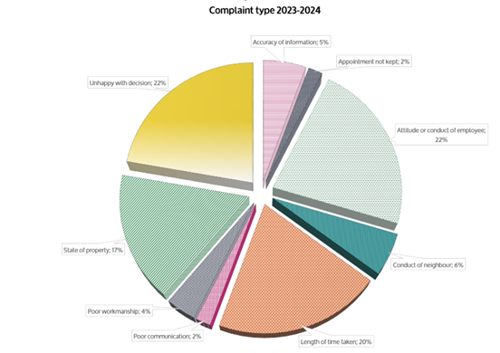
Chart information
A chart containing 9 segments in order of the volumes of specific complaint type category for the 2023 to2024 financial year.
Complaint types in order by volume are ‘unhappy with decision’ (22 percent), ‘attitude or conduct of employee’ (22 percent), ‘length of time’ (20 percent), ‘state of property’ 17 percent), ‘conduct of neighbour’ (6 percent), ‘accuracy of information’ (6 percent), ‘poor workmanship’ (4 percent), ‘poor communication’ (2 percent), ‘appointment not kept’ (2 percent).
The percentage of complaints by type is shown in the following table and is compared to the previous financial year. “Unhappy with decision” is the highest complaint reason and equates to nearly a quarter of all complaints and is higher than same period last financial year. Whereas we have seen a significant decrease in the number of complaints relating to “poor workmanship” and “poor communication” based on the proportions of the last financial year.
| Complaint Type | Precentage of complaints within financial year 2023-2024 |
Precentage of complaints within financial year 2022-2023 |
|---|---|---|
| Attitude or conduct of employee | 22.22% (12) | 31.2% (24) |
| Unhappy with decision | 22.22% (12) | 5.2% (4) |
| Length of time taken | 20.37% (11) | 18.2% (14) |
| State of property | 16.67% (9) | 14.3% (11) |
| Conduct of neighbour | 5.56% (3) | 1.3% (1) |
| Accuracy of information | 5.56% (3) | 5.2% (4) |
| Poor workmanship | 3.70% (2) | 14.3% (11) |
| Poor communication | 1.85% (1) | 10.4% (8) |
| Appointment not kept | 1.85% (1) | 0% (0) |
2.7 Breakdown of complaints by complainant’s ethnicity
The ethnicity of the complainant (including both stage one and two) is monitored based on the information held in the Capita OpenHousing system, at the time of making the complaint and is not collected as part of the complaints process, to avoid any allegations of bias. The breakdown continues to be relatively consistent with the tenant base. A project group is currently reviewing the diversity information held on tenants and the implementation of tenancy audits to ensure that tenant data is reviewed with tenants on a regular basis, to ensure accuracy.
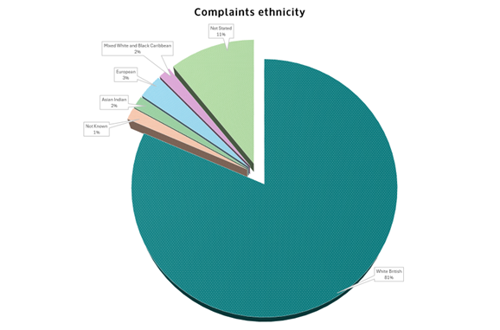
Chart information
A pie chart containing 6 segments of the volumes of specific ethnicity of stage one complainants for the 2023 to 2024 financial year.
Complaint types in order by volume are ‘white British’ (81 percent), ‘not stated’ (11 percent), ‘European’ (3 percent), ‘Asian Indian’ (2 percent), ‘mixed white and black Caribbean’ (2 percent), ‘not known’ (1 percent).
2.8 Compensation awards as part of complaint outcomes
A total of £1814.48 has been offered to tenants, in compensation or ex-gratia payments, as a remedy for resolving the complaints and acknowledging the impact of service failure, this incorporates complaints at all levels, including awards made by the Housing Ombudsman Service.
2.9 Expressions of dissatisfaction excluded from the complaint process
There have been 4 expressions of dissatisfaction received, which were not accepted for investigation through the complaints process, as they met one of the exceptions within the Complaints and Compliments Policy.
Details of the cases are as follows:
Month: May
- Tenant in Sutton
- Dissatisfaction related to a legal decision, in relation to the enforcement of an access injunction awarded by the Courts.
- An additional element of the dissatisfaction related to allegations of ASB, which was considered to be a service request.
- Tenant in Sutton
- Expression of dissatisfaction submitted on tenant’s behalf by HOS.
- Dissatisfaction related to the care of the tenant’s dog whilst the tenant was in Police custody.
- Complaint not accepted as the Council believed the duty of care lies with Nottinghamshire Police to ensure wellbeing of the dog whilst owner was in custody.
- Further information was subsequently received from HOS, following a review of the dissatisfaction and the complaint accepted on their instruction.
- The complaint was not upheld at stages one and two.
- The tenant has recently requested that the Housing Ombudsman service investigate the case.
Month: June
- Tenant in Sutton
- The request to make a complaint was the first report of concerns relating to the condition of the property following being re-let.
- The complaint was not accepted and the dissatisfaction was responded to as a service request.
Month: August
- Tenant in Sutton
- A representative submitted a complaint on behalf of the tenant, in relation to the Council’s handling of an alleged pest infestation at the property. Upon seeking authority from the tenant to disclose information to the representative, they advised that they had no knowledge of the complaint being made on their behalf and that they were satisfied with the Council’s actions to address their service request. The representative was notified that the complaint would not be accepted as the tenant had confirmed they were not dissatisfied with the service provided by the Council.
2.10 Housing Ombudsman Complaints
During 2023 to 2024 one new complaint was referred to the Housing Ombudsman Service (HOS) for investigation. All relevant supporting information was provided to HOS in March 2024, to assist the HOS with their investigation. A determination is expected by the end of June 2024.
One complaint remained with the HOS for investigation following a referral by a tenant in 2022 to 2023. In November 2023 we received notification that the HOS had concluded their investigation and had determined that there had been no service failure on behalf of the Council.
A complaints satisfaction survey is sent to all stage one complainants as part of the resolution documentation for their complaint. We also provide complainants with the option to complete an online survey, where they can send feedback online about the process and learning from the complaints process.
During 2023 to 2024 only 5 complainants have returned a completed satisfaction survey of their own accord, which is a response rate of 9.26 percent, which is slightly higher than historical response rates. Low response rates and low rates of escalation to stage two are considered as a positive. In 2024 to 2025 the approach to surveying tenants regarding their satisfaction with the complaints process is to be reviewed to attempt to encourage more complainants to provide feedback on their experience with the complaints process.
Below is a breakdown of the responses submitted by the survey respondents. The responses are relatively consistent with historical responses where the complainant is typically either very satisfied with the complaint handling and does not wish to escalate to the next stage or they are very dissatisfied with the complaint handling and wish to escalate to stage two.
Overall how satisfied are you with the handling of your complaint?
- Respondent 1 - Fairly satisfied
- Respondent 2 - Very satisfied
- Respondent 3 - Very dissatisfied
- Respondent 4 - Very dissatisfied
- Respondent 5 - Very satisfied
How satisfied are you that the staff who dealt with your complaint were helpful and polite?
- Respondent 1 - Very satisfied
- Respondent 2 - Very satisfied
- Respondent 3 - Very satisfied
- Respondent 4 - Very satisfied
- Respondent 5 - Very satisfied
How satisfied are you that the complaints process is easy to access and understand?
- Respondent 1 - Very satisfied
- Respondent 2 - Fairly satisfied
- Respondent 3 - Neutral
- Respondent 4 - Very dissatisfied
- Respondent 5 - Very satisfied
Overall how satisfied with the outcome of your complaint?
- Respondent 1 - Very satisfied
- Respondent 2 - Very dissatisfied
- Respondent 3 - Very dissatisfied
- Respondent 4 - Very dissatisfied
- Respondent 5 - Very satisfied
How satisfied are you that all areas of your complaint were addressed?
- Respondent 1 - Very satisfied
- Respondent 2 - Very dissatisfied
- Respondent 3 - Very dissatisfied
- Respondent 4 - Very dissatisfied
- Respondent 5 - Very satisfied
How satisfied are you that the reasons for the outcome of your complaint were fully explained?
- Respondent 1 - Very satisfied
- Respondent 2 - Neutral
- Respondent 3 - Very dissatisfied
- Respondent 4 - Very dissatisfied
- Respondent 5 - Very satisfied
If you are not fully satisfied with the outcome of your complaint, do you accept that explanation that has been offered?
- Respondent 1 - Yes
- Respondent 2 - No
- Respondent 3 - No
- Respondent 4 - No
- Respondent 5 - Yes
If you are not satisfied with the outcome of your complaint, will you be taking it to the next stage?
- Respondent 1 - No
- Respondent 2 - Yes
- Respondent 3 - Yes
- Respondent 4 - Yes
- Respondent 5 -
- No
4.1 Actions from learning from complaints
We record any learning outcomes from complaints that require further action or changes to policy, process, or procedure.
A colour coded risk rating for each of the actions coming out of complaints is assigned to each action. This is based on the level of potential risk to the Authority/Tenant for not addressing the action and a future complaint relating to these actions occurring, which may result in a service failure or maladministration finding from the Housing Ombudsman.
From the complaints responded to during 2023-24, 41 learning outcomes were identified, to date 34 or 83% of which have all been implemented by service areas.
Complaint learning outcomes have reduced by 56% since the same period last financial year. Whilst complaint volumes fell, this was by a significantly smaller amount and case outcomes rates remain relatively similar.
A summary of the learning outcomes is as follows:
| Risk category | Number of learning outcomes | Number implemented | Percentage implemented |
|---|---|---|---|
| Red | 8 | 8 | 100% |
| Amber | 21 | 18 | 86% |
| Green | 12 | 8 | 67% |
| Total | 41 | 34 | 83% |
A breakdown of the learning outcomes identified is as follows:
- Officer was reminded to ensure formal warnings are served in line with investigation processes and procedures
- Voids Team were reminded to inspect all lofts when the property is void and ensure that the previous tenants’ items are cleared during the void period
- The Leaseholder permissions process is to be streamlined and officers made aware of the process
- Joint contractor and council visits to be undertaken in the future at a specific address during major works project to ensure consistency
- Call centre team received refresher training on the process relating to reports of drainage issues from tenants and what information can be passed to tenants wishing to make a complaint
- Call centre team reminded of the importance of listening to all the tenant’s query to help with better understanding and response to the issue
- Discuss missed appointment/delays with the third-party contractor to help with improving their service when working on our behalf
- Refresher session provided to officer on improving communication to provide clear understanding to tenants so they have understanding how we are dealing with their concerns
- Assets to liaise with lettings when major works being undertaken in a void property to identify how quickly the property will be let
- Call recordings shared with officer, so that they can reflect on their tone and some of the comments made. Officer reminded to remain courteous and professional during interactions with tenants
- Officer reminded to re-direct anti-social behaviour related calls to the allocated case officer where there is an open case, and the investigation is ongoing
- Feedback/guidance provided to officer on how to manage similar types of calls more effectively
- Officer reminded to review tenancy records prior to undertaking visits, consider vulnerabilities and involve support agencies when attempting to resolve tenancy issues
- Officer reminded to fully investigate an issue before reaching a conclusion and to remain impartial throughout investigations
- Officer (and the wider team) provided with refresher training on how to deal with vulnerable tenants
- Works continuing to suppress appointment confirmation text messages being sent to tenants when all works are external, and the tenant is not required to be home for the appointment
- Officers reminded to ensure that materials are ordered and are ready in time for the work order to be completed. If not, ensure that the tenant is kept fully informed
- Contingency plan put in place during long term sickness for inspectors’ calendars to reduce requirement for rescheduling appointments
- Major works contractors to highlight addresses where tenants are unable to remove flooring to the Council and are not commence works until issue resolved
- Officer reminded to allow a postponement of meetings where a tenant wishes to seek legal advice and in consideration of any other circumstances around impact of the service of legal documents on a tenant’s health
- Complaint investigators to check that relevant GDPR forms are completed at the beginning of the complaints process to avoid unnecessary delays in sending the response
- Officer to be reminded of the process to follow when receiving service requests from other departments and of the customer service standards expected
- Discussions had with contractor on how to improve their service and expectations when working on our behalf
- Call centre team received refresher training on consistency when dealing with calls
- Timescales to be put in place for officer to complete internal checks required for rent refund applications within 5 working days of receipt, to ensure that target overall response time of 28 working days is met
- Officer reminded of the complaints process and to be given feedback on the call with advice on how to remain impartial and manage calls more effectively
- Officers reminded to be mindful not to stand on tenants’ personal items during visits
- Review of the 'no gas' process to take place to ensure appropriate steps are taken/support provided to attempt to reinstate the gas supply as soon as possible
- Alleged inappropriate comments to tenant when reporting anti-social behaviour issues to Police call centre to be raised with the area Police contact
- Responsible team reminded of need to expedite the collection of needles/drugs paraphernalia when reported
- Officer reminded of GDPR requirements and not to discuss personal circumstances of residents in public areas of the court at any time
- Officer reminded that if they are made aware of any issues concerning the welfare of residents, these should be reported to the appropriate officer within the Council or their line manager as soon as possible
- Support referrals to external agencies to be reviewed by a Team Leader or Manager in one to ones with support officers, to ensure these are pursued with the agency concerned or for alternative action to be taken
- Officers reminded, that any part required must be ordered within a satisfactory time frame
- Officers reminded of the processes and procedures for recording visits where they feel under threat of violence or harassment
- Refund of overpaid rent application form and declaration to be updated to make clear how the refund will be calculated, and that it will be reduced by the equivalent of one week’s rent
- Guidance provided to officer regarding the process for the delivery of formal notices and including their communication styles ensuring that full consideration is given in particularly sensitive situations
- Contractor reminded of expected/appropriate behaviour when working on our behalf
- Officers reminded not to pass comment regarding matters when they do not have all the information.
4.2 Changes to complaints process
There have been no changes to the complaint handling process during 2023 to 2024. However, amended Complaints and Compliments Policy and Housing Complaints Procedure were implemented on 1 April 2024.
4.3 Emerging themes from complaints
Analysis has taken place across the themes/types of complaints we have received. The main areas and lessons emerging for services are:
Stage one complaints not responded to within complaint handling code timescales
A small number of stage one complaints have not been handled in line with the deadlines set out in the Housing Ombudsman Service’s Complaint Handling Code. It is imperative that all complaints, are handled in line with the code, including the requirements for acknowledging complaints. Compliance with the complaint handling code is now a statutory requirement and will be closely monitored by the Housing Ombudsman and forms part of the Tenant Satisfaction Measures return to the Regulator of Social Housing. Service areas are reminded to follow the requirements set out in the Council’s Complaints and Compliments Policy, and the Housing Complaints Procedure to ensure that complaints are thoroughly investigated and responded to as quickly as possible, to minimise the impact on the complainant.
Declining complaint volumes
Whilst stage one complaints remain higher than historical levels, the number of complaints received during 2023 to 2024 has reduced against the previous year. From 1 April 2024 the Housing Ombudsman Service’s Complaint Handling Code has removed the ability to resolve complaints informally, service areas should ensure that all expressions of dissatisfaction are logged as a formal complaint (subject to the exceptions permitted in the Complaints Policy) and are formally investigated in line with the Complaints Policy, and that all officers are aware to the complaints process to ensure that they support complainants to access the process, by assisting to overcome any barriers, where possible. Complaints are a valuable source of information around the performance of teams/processes and should be welcomed by all areas of the business.
Proportion of complaints escalating to stage two
The proportion of complaints escalating to stage two of the process has increased since the last financial year, despite stage one complaints reducing. Stage two decisions and the correlation of these against stage one decisions are being monitored, to ensure that all efforts are being made to ensure that all efforts are being made to attempt to resolve complaints as early as possible. Currently the rate of stage two complaints overturning stage one decisions and escalations to the Housing Ombudsman Service (and their findings against the Council) are relatively low, which suggests that stage one outcomes are appropriate.
Declining learning outcomes
Learning outcomes have decreased considerably during 2023 - 2024 compared to the previous financial year, despite similar proportion of the complaints being upheld or partially upheld. Complaint volumes have, however, decreased which could account for some of the reduction. Complaints are a valuable source of learning, and it is important that service areas are mindful of any learning outcomes that could be implemented, regardless of the outcome of the complaint, to ensure that tenants or leaseholders do not experience similar dissatisfaction in the future. Learning outcomes should be maximised and implemented as soon as possible to ensure the improvement of services through the tenant / leaseholder voice.
The Authority’s Complaints and compliments policy and Housing complaints procedure remained in line with the Housing Ombudsman’s complaint handling code during 2023 to 2024.
Both documents have now been updated and implemented to ensure compliance with the new Complaint handling code, which went live on 1 April 2024. A further amendment has been made following a change of correspondence address for the Housing Ombudsman Service.
A self-assessment against the Complaint Handling Code and the contents of this report were reported to the Council's Cabinet on 17 June 2024.
The self-assessment was approved and found to be reflective of the Council's approach to complaints. A copy of the self-assessment has been published on our website and can be found on
- link: Housing complaints guide
The Council's Cabinet comments on this report can be found in:
The Housing Ombudsman Service have a duty to monitor landlords' compliance with their Complaint Handling Code, which is a statutory instrument. In order to demonstrate compliance we have submitted an annual return to the Ombudsman, which includes details of our self-assessment, this report and Cabinet's comments on this report.
Contact details
- Housing
- tenants.matter@ashfield.org.uk
- 01623 457590
-
Ashfield District Council
Council Offices
Urban Road
Kirkby in Ashfield
Nottinghamshire
NG17 8DA
Page last updated 15 December 2025
